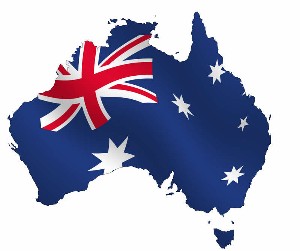Australian PM Tony Abbott was born in the UK in 1957. Being born in the UK between 1948 and 1983, he immediately became a British citizen by birth. His mother was an Australian citizen, so he also immediately acquired the right to Australian citizenship by descent.
Paperwork and patriotism

The law in force at the time provided automatic citizenship by descent on registering with the Australian government, for anyone under the age of 25. Abbott’s parents didn’t do this at the time of his birth, and also didn’t do this when they moved to Australia in 1960, when Tony was three years old, as assisted migrants (Ten Pound Poms).
Abbott acquired Australian citizenship by registration in 1981, at the age of 23, when he applied for a Rhodes scholarship to Oxford University. Taking an Australian Rhodes scholarship requires you to have Australian citizenship, and to have been resident in Australia for five of the last 10 years. Abbott presumably discovered on application that he wasn’t the Australian citizen he believed himself to be [1].
Not worrying about formal nationality was common at the time of Abbott’s birth and emigration: British and Australian nationality were only legally separated with the two countries’ 1948 citizenship acts, and up until 1973 the distinction remained irrelevant for most practical purposes. British citizens [2] were eligible to move to Australia without strict migration criteria, vote in Australian elections, and become Australian citizens after a year’s residence without having to undergo the naturalisation process that applied to other foreigners. For another decade, up until 1984, British citizens were eligible to vote and stand for office in Australia without becoming Australian citizens – and British citizens who were on the electoral roll in 1984 and continue to reside in Australia remain eligible.
So, Abbott’s parents were a bit crap at admin, in a context where nobody really thought that the legal difference between British and Australian citizenships mattered (the majority of Australians in 1960, and a large proportion in 1980, had been legally British during their own lifetimes despite never having set foot in the UK, because all Australians were legally British until 1948). His parents filled out a form well within the allowable 25 years allowing him to claim citizenship through birth rather than naturalisation.
People going on about this aspect of Abbott’s early life are basically idiots, with fewer legs to stand on than the average snake.
Independence Day: 3 March 1986

The Australia Act 1986, passed simultaneously in the UK and Australian parliaments, severed Australia’s remaining formal colonial ties to the UK [3]. The UK Parliament renounced its right to legislate with effect in Australia (at state or federal level), the UK government renounced all powers to advise the Queen on Australian matters, and the UK Privy Council lost its status as Australia’s official highest court of appeal.
The long title to the Act describes Australia as “a sovereign, independent and federal nation”, and the High Court of Australia confirmed in Shaw vs Minister for Immigration in 2003 that the Act marks the start date for Australian independence. As well as being a far better date to celebrate Australia’s national day than either the current Australia Day (commemorating the First Fleet of white criminals and prison guards on 26 January, 1788) or the sometimes-suggested alternative of Federation Day (commemorating the establishment of the federal parliament on 1 January, 1901), this declaration of independence had a particularly weird unforeseen consequence for federal politics.

One of the major drivers behind Federation was settler paranoia about non-white people and people of non-English descent, and the desire to impose greater control on borders [4]. This is reflected in the Constitution, whose Section 44i bans people who are “a citizen… of a foreign power” from standing for federal parliament.
This clause came out of fear of fifth-columnists, traitors, Germans, Chinese spies, and all the other things that continue to fill the nightmares of white right-wing hicks. Since all Australians were British citizens at the time, nobody from the British Empire was considered to be of a foreign power; that only applied to the weird ones who ate garlic, drank coffee and didn’t even speak English. But if you were of German birth and wanted to stand for federal parliament, you needed to renounce your German citizenship first, even if this wasn’t cancelled upon your acquisition of Australian citizenship.
You can probably see where this one is going
After the Australia Act 1986, the High Court determined in Sue vs Hill (1999) that since Australia was independent, the UK was now also on the list of undesirable places full of dirty foreign traitors who shouldn’t be allowed to sully the federal parliament’s door – and therefore, that anyone who was an Australian/UK dual national was required to renounce their citizenship before they were elected to federal parliament, just like dual nationals of other countries.
In a country with a flexible constitution, this would have been a good cue to take the sensible measure of repealing a ridiculous law enacted by 19th century xenophobes and serving no purpose whatsoever. But the Australian constitution is extremely hard to amend, requiring a process of national referendums, which would be overkill over a mild and faintly embarrassing procedural inconvenience – so Section 44i remains in force. Anyone born a foreign citizen seeking federal office needs not only to become an Australian citizen, but also to renounce their foreign citizenship.
Which brings us to the more significant accusations against Abbott.

Former PM Julia Gillard, also UK-born, made clear as PM that she had formally renounced her British citizenship before entering the Australian parliament in 1998. Abbott has never said this publicly in the same way, arousing suspicions from various corners. Yesterday (2 September), his office issued a statement that “The Prime Minister is an Australian citizen and does not hold citizenship of any other country”.
This is a noticeably less strong claim than the one that Gillard made: it could mean he renounced his UK citizenship either before standing for parliament, or at some point after becoming an MP, or last week.
Screeching Birthers are still talking out of their arses
But Tony Abbott’s eligibility to be a federal MP in this parliament doesn’t hinge on whether he had renounced UK citizenship in 1994, when he first became MP for Warringah – it hinges on whether he had renounced UK citizenship at the date of the last federal election, which was his second as Leader of the Opposition and prospective Prime Minister. It’s vanishingly unlikely, given that Section 44i and Sue vs Hill are both known quantities, that the Liberal Party would have been incompetent enough to go to election twice with a leader who was ineligible for office.
Even if this had somehow happened, which would be hilarious, the result would be to invalidate Abbott’s election as MP for Warringah, forcing a by-election in an safe Liberal seat, with a large continued Liberal-National majority in the lower house even in the extremely unlikely event that the by-election were lost. There would be no requirement in the constitution for Abbott to stand down as PM at this point: the PM isn’t mentioned in the constitution, and there is no legal requirement for the PM to be an MP. More likely, he’d stand in the by-election (since we know he is now eligible), win it, and then carry on regardless.
Nonetheless, the whole shebang does draw attention to an extremely silly constitutional provision that Australia would be best without.
[1] Something rather like this happened to a friend’s sister, who was born in Australia after the 1986 Australian Citizenship (Amendment) Act to parents who at the time were not permanent residents. She discovered aged 18, having lived her whole life in Australia, that she wasn’t an Australian citizen and needed to apply for naturalisation rather urgently.
[2] For reasons that are painfully complicated, the law actually referred to British subjects, which is not quite the same thing as British citizens, but that’s a post for another day.
[3] Elizabeth II’s powers in Australia are as Queen of Australia, not as Queen of the United Kingdom.
[4] luckily, this no longer applies to anybody ever.
A minor correction:
While the Constitution does indeed not mention the office of Prime Minister, it does mention “Ministers of State”. Section 64 states that a Minister of State shall be an MP or Senator, or must become one within three months.
So yes, even if this nonsense if proven to be true (unlikely) he could stay PM for three months, which would be enough time to renounce his UK citizenship and then run in the by-election in Warringah.